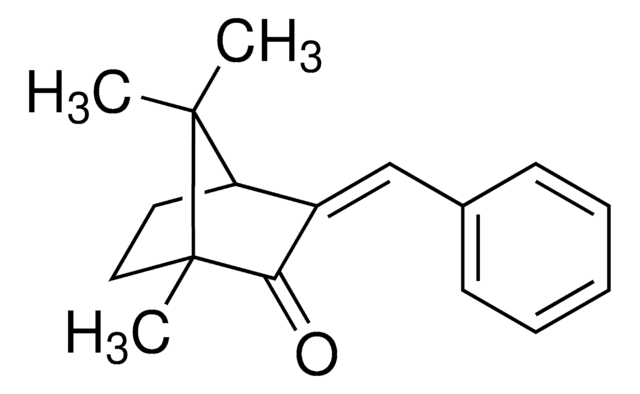46204
4-Heptanone
analytical standard
Synonyme(s) :
Butyrone, Dipropyl ketone
About This Item
Produits recommandés
Qualité
analytical standard
Densité de vapeur
3.93 (vs air)
Pression de vapeur
5.2 mmHg ( 20 °C)
Durée de conservation
limited shelf life, expiry date on the label
Technique(s)
HPLC: suitable
gas chromatography (GC): suitable
Indice de réfraction
n20/D 1.407 (lit.)
Point d'ébullition
145 °C (lit.)
Pf
−33 °C (lit.)
Densité
0.817 g/mL at 25 °C (lit.)
Application(s)
cleaning products
cosmetics
environmental
flavors and fragrances
food and beverages
personal care
Format
neat
Chaîne SMILES
CCCC(=O)CCC
InChI
1S/C7H14O/c1-3-5-7(8)6-4-2/h3-6H2,1-2H3
Clé InChI
HCFAJYNVAYBARA-UHFFFAOYSA-N
Vous recherchez des produits similaires ? Visite Guide de comparaison des produits
Application
Produits recommandés
Mention d'avertissement
Warning
Mentions de danger
Conseils de prudence
Classification des risques
Acute Tox. 4 Inhalation - Flam. Liq. 3
Code de la classe de stockage
3 - Flammable liquids
Classe de danger pour l'eau (WGK)
WGK 2
Point d'éclair (°F)
120.2 °F - closed cup
Point d'éclair (°C)
49 °C - closed cup
Équipement de protection individuelle
Eyeshields, Faceshields, Gloves, type ABEK (EN14387) respirator filter
Faites votre choix parmi les versions les plus récentes :
Déjà en possession de ce produit ?
Retrouvez la documentation relative aux produits que vous avez récemment achetés dans la Bibliothèque de documents.
Notre équipe de scientifiques dispose d'une expérience dans tous les secteurs de la recherche, notamment en sciences de la vie, science des matériaux, synthèse chimique, chromatographie, analyse et dans de nombreux autres domaines..
Contacter notre Service technique








